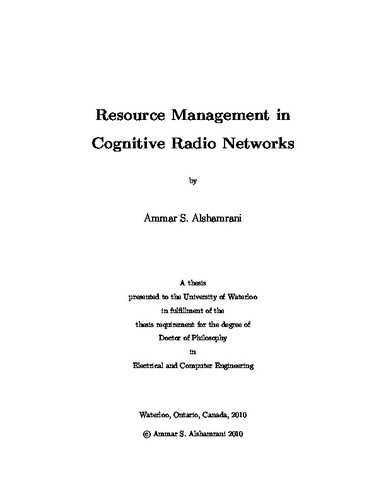| dc.description.abstract | In the last decade, the world has witnessed rapid increasing applications of wireless networks. However, with the fixed spectrum allocation policy that has been used since the beginning of the spectrum regulation to assign different spectrum bands to different wireless applications, it has been observed that most of the allocated spectrum bands are underutilized. Therefore, if these bands can be opportunistically used by new emerging wireless networks, the spectrum scarcity can be resolved. Cognitive Radio (CR) is a revolutionary and promising technology that can identify and then exploit the spectrum opportunities. In Cognitive Radio Networks (CRNs), the spectrum can be utilized by two kinds of users: Primary Users (PUs) having exclusive licenses to use certain spectrum bands for specific wireless applications, and Secondary Users (SUs) having no spectrum licenses but seeking for any spectrum opportunities. The SUs can make use of the licensed unused spectrum if they do not make any harmful interference to the PUs. However, the variation of the spectrum availability over the time and locations, due to the coexistence with the PUs, and the spread of the spectrum opportunities over wide spectrum bands create a unique trait of the CRNs. This key trait poses great challenges in different aspects of the radio resource management in CRNs such as the spectrum sensing, spectrum access, admission control, channel allocation, Quality-of-Service (QoS) provisioning, etc.
In this thesis, we study the resource management of both single-hop and multi-hop CRNs. Since most of the new challenges in CRNs can be tackled by designing an efficient Medium Access Control (MAC) framework, where the solutions of these challenges can be integrated for efficient resource management, we firstly propose a novel MAC framework that integrates a kind of cooperative spectrum sensing method at the physical layer into a cooperative MAC protocol considering the requirements of both the SUs and PUs. For spectrum identification, a computationally simple but efficient sensing algorithm is developed, based on an innovative deterministic sensing policy, to assist each sensing user for identifying the optimum number of channels to sense and the optimum sensing duration. We then develop an admission control scheme and channel allocation policy that can be integrated in the proposed MAC framework to regulate the number of sensing users and number of access users; therefore, the spectrum identification and exploitation can be efficiently balanced. Moreover, we propose a QoS-based spectrum allocation framework that jointly considers the QoS provisioning for heterogeneous secondary Real-Time (RT) and Non-Real Time (NRT) users with the spectrum sensing, spectrum access decision, and call admission control. We analyze the proposed QoS-based spectrum allocation framework and find the optimum numbers of the RT and NRT users that the network can support. Finally, we introduce an innovative user clustering scheme to efficiently manage the spectrum identification and exploitation in multi-hop ad hoc CRNs. We group the SUs into clusters based on their geographical locations and occurring times and use spread spectrum techniques to facilitate using one frequency for the Common Control Channels (CCCs) of the whole secondary network and to reduce the co-channel interference between adjacent clusters by assigning different spreading codes for different clusters.
The research results presented in this thesis contribute to realize the concept of the CRNs by developing a practical MAC framework, spectrum sensing, spectrum allocation, user admission control, and QoS provisioning for efficient resource management in these promising networks. | en |

